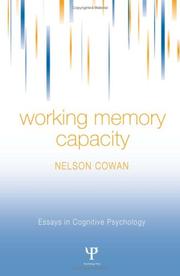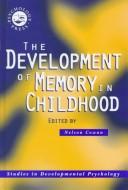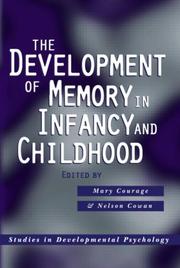| Listing 1 - 9 of 9 |
Sort by
|

ISBN: 0195067606 9780195067606 9786610529766 0195344251 1280529768 0198023227 1429401443 Year: 1995 Volume: no. 26 Publisher: New York : Oxford : Oxford University Press ; Clarendon Press,
Abstract | Keywords | Export | Availability | Bookmark
 Loading...
Loading...Choose an application
- Reference Manager
- EndNote
- RefWorks (Direct export to RefWorks)
Attention and Memory brings together and assesses past and present research on information processing, to formulate a model of this entire system.
Aandacht --- Aandacht [Psychologie] --- Attention --- Attention [Psychologie] --- Attention [Psychology] --- Concentration --- Forgetfulness --- Geheugen --- Human information processing --- Informatiestroom--Verwerking door de mens --- Information [Traitement de l'] chez l'homme --- Memory --- Mémoire --- Oubli --- Retention (Psychology) --- Traitement de l'information chez l'homme --- Vergeten --- Mental Processes. --- Memory. --- Attention. --- Human information processing. --- Information, Traitement de l', chez l'homme --- Intellect --- Psychology --- Thought and thinking --- Comprehension --- Executive functions (Neuropsychology) --- Mnemonics --- Perseveration (Psychology) --- Reproduction (Psychology) --- Information processing, Human --- Bionics --- Information theory in psychology --- Perception --- Concentration (Psychology) --- Flow (Psychology) --- Apperception --- Arousal (Physiology) --- Educational psychology --- Distraction (Psychology) --- Interest (Psychology) --- Experimentele psychologie --- geheugen en aandacht --- geheugen en aandacht. --- Mémoire --- Humans --- Memory (Mental processes)

ISBN: 9781841690971 184169097X 9780203342398 9781135432010 9781135432058 9781135432065 9781138006041 Year: 2005 Publisher: New York, NY ; Hove, East Sussex, UK : Psychology Press,
Abstract | Keywords | Export | Availability | Bookmark
 Loading...
Loading...Choose an application
- Reference Manager
- EndNote
- RefWorks (Direct export to RefWorks)
Memory, Short-Term. --- Psychological Theory. --- Short-term memory. --- Mémoire immédiate --- 159.95*1 --- Cognitieve psychologie --- 159.95*1 Cognitieve psychologie --- Mémoire immédiate --- Short-term memory --- Immediate memory --- Working memory --- Memory --- Memoire de travail --- Mémoire --- Mémoire de travail --- Mémoire à court terme.

ISBN: 0863774954 Year: 1997 Publisher: Hove : Psychology Press,
Abstract | Keywords | Export | Availability | Bookmark
 Loading...
Loading...Choose an application
- Reference Manager
- EndNote
- RefWorks (Direct export to RefWorks)
Book
ISBN: 0863774962 Year: 1997 Publisher: Hove Psychology press
Abstract | Keywords | Export | Availability | Bookmark
 Loading...
Loading...Choose an application
- Reference Manager
- EndNote
- RefWorks (Direct export to RefWorks)
#PBIB:1999.1 --- Experimentele psychologie --- geheugen en aandacht --- geheugen en aandacht.

ISBN: 9781841696423 9780203934654 0203934652 1841696420 1135419817 9781135419813 1281754234 9781281754233 9786611754235 6611754237 Year: 2009 Publisher: Hove, East Sussex ; : New York :. Psychology Press,
Abstract | Keywords | Export | Availability | Bookmark
 Loading...
Loading...Choose an application
- Reference Manager
- EndNote
- RefWorks (Direct export to RefWorks)
Memory in children. --- Mémoire chez l'enfant --- Mémoire chez l'enfant
Book
ISBN: 0367860333 0367860376 1003016537 1000576272 1000576310 1003016537 Year: 2022 Publisher: Milton Taylor & Francis Group
Abstract | Keywords | Export | Availability | Bookmark
 Loading...
Loading...Choose an application
- Reference Manager
- EndNote
- RefWorks (Direct export to RefWorks)
Book
ISBN: 0198842287 9780198842286 Year: 2021 Publisher: Oxford : Oxford university press,
Abstract | Keywords | Export | Availability | Bookmark
 Loading...
Loading...Choose an application
- Reference Manager
- EndNote
- RefWorks (Direct export to RefWorks)
Working memory refers to how we keep track of what we are doing moment to moment throughout our waking lives. It allows us to remember what we have just done, focus on what we are doing now, to solve problems, be creative, think about what we will be doing in the next few seconds, and continually to update in our mind changes around us throughout the day. This book brings together in one volume, state-of-the-science chapters written by the most productive and well known working memory researchers worldwide. Chapters cover different approaches to understanding how working memory works, using behavioural experimental techniques, neuroimaging, computational modelling, how it changes from childhood through to healthy old age, how it is affected by dementia and brain damage, and how it is used in everyday life. A unique feature of the book is that each chapter starts with answers to a set of common questions for all authors. This allows readers very rapidly to compare key differences in theoretical assumptions and approaches to working memory across chapters, and to understand the theoretical context before going on to read each chapter in detail. Uniquely, all authors consider evidence that is not consistent with their theoretical assumptions, whereas it is common for authors to ignore contradictory evidence. This approach leads to new interpretations and new hypotheses to test in future research and greatly enhances our understanding of this crucial human ability. Written and edited by the leading researchers in the field, the book will be an important and influential addition to the memory literature.
Book
ISBN: 9780192665584 9780192849069 Year: 2023 Publisher: Oxford Oxford University Press
Abstract | Keywords | Export | Availability | Bookmark
 Loading...
Loading...Choose an application
- Reference Manager
- EndNote
- RefWorks (Direct export to RefWorks)
Memory is essential for every day life. The understanding and study of memory has continued to grow over the years, thanks to well controlled laboratory studies and theory development. However, major challenges arise when attempting to apply theories of memory function to practical problems in society. A theory might be robust in explaining experimental data but fail to capture all that is important when taken out of the lab.The good news is that the application of memory in science to challenges in society is rapidly expanding, and Memory in Science for Society bridges that gap. Inspired by the synergy between theory and application in memory research, leading international researchers share their passion for combining memory in science with applications of that science to a wide range of challenges in society. Chapters demonstrate how that scientific passion has addressed challenges in education, lifeattainment, second language learning, remembering life events and faces of strangers, future planning and decision making, lifespan cognitive development and age-related cognitive decline, following instructions, and assessment and rehabilitation of cognitive impairment following brain damage.Written and edited by the leading researchers in the field, the book will be an important and influential addition to the memory literature, providing a new and comprehensive focus on the connection between theory and practice in memory and society.
Book

ISBN: 1783093609 1783093595 9781783093595 9781783093601 1783093587 Year: 2015 Publisher: Bristol Blue Ridge Summit
Abstract | Keywords | Export | Availability | Bookmark
 Loading...
Loading...Choose an application
- Reference Manager
- EndNote
- RefWorks (Direct export to RefWorks)
This unique volume offers a comprehensive discussion of essential theoretical and methodological issues concerning the pivotal role of working memory in second language learning and processing. The collection opens with a foreword and introductory theoretical chapters written by leading figures in the field of cognitive psychology. Following these are three research sections containing chapters providing original data and innovative insights into the dynamic and complex relationships between working memory and specific areas of second language processing, instruction, performance and development. Each section concludes with a commentary which is written by a noted SLA researcher and which charts the course for future research. This book provides a fascinating collection of perspectives on the relationship between working memory and second language learning and will appeal to those interested in the integration of cognitive psychology with SLA research.
Second language acquisition --- Memory. --- Psycholinguistics. --- Language, Psychology of --- Language and languages --- Psychology of language --- Speech --- Linguistics --- Psychology --- Thought and thinking --- Retention (Psychology) --- Intellect --- Comprehension --- Executive functions (Neuropsychology) --- Mnemonics --- Perseveration (Psychology) --- Reproduction (Psychology) --- Second language learning --- Language acquisition --- Psychological aspects. --- Psychological aspects --- Bilingualism and Cognition. --- Cognitive Psychology. --- Executive Control. --- Instructed SLA. --- L2 Interaction. --- Language and Cognition. --- Phonological Short-term Memory. --- Second Language Acquisition and Processing. --- Second Language Acquisition. --- Working Memory. --- second language development. --- second language instruction. --- second language performance.
| Listing 1 - 9 of 9 |
Sort by
|

 Search
Search Feedback
Feedback About UniCat
About UniCat  Help
Help News
News